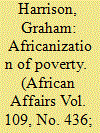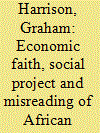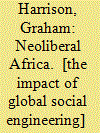| Srl | Item |
| 1 |
ID:
098083


|
|
|
|
|
| Publication |
2010.
|
| Summary/Abstract |
This article explores the ways in which the British campaign coalition Make Poverty History represented Africa throughout 2005. Focusing particularly on the G8 Gleneagles summit, Make Poverty History (MPH) asserted a series of justice claims which had no geographical reference. Nevertheless, as a result of internal tensions within the coalition, and especially as a result of the ways in which MPH interacted with other political agencies as the summit approached, MPH's messages became increasingly interpolated by references to Africa as a result of the emergence of government, media, and celebrity involvement. The result of this was that global poverty increasingly became an African issue. As 2005 became the 'Year of Africa', the justice messages that constituted MPH were largely effaced by the more familiar imperial legacy which represents Africa as a place of indigence in need of outside assistance.
|
|
|
|
|
|
|
|
|
|
|
|
|
|
|
|
| 2 |
ID:
066958


|
|
|
| 3 |
ID:
084748


|
|
|
|
|
| Publication |
2008.
|
| Summary/Abstract |
Governance reform practice has mostly focused on building up and transforming central state institutions. Furthermore, the politics of aid has often constructed a very 'introverted' politics based in large cities. This article explores the means through which governance ideas are implemented outside this 'governance realm', by looking at the ways in which the Lushoto District government in Tanzania has mediated a range of policy changes that have emanated from the state/donor centre. Identifying three distinct but inter-related repertoires of political practice, it argues that governance at the local level has been largely about financial management, and that this aspect of reform is in tension with local developmentalism and is more starkly opposed to local veranda politics.
|
|
|
|
|
|
|
|
|
|
|
|
|
|
|
|
| 4 |
ID:
097574


|
|
|
|
|
| Publication |
London, Zed Books, 2010.
|
| Description |
178p.
|
| Standard Number |
9781848133198, hbk
|
|
|
|
|
|
|
|
|
|
|
|
Copies: C:1/I:0,R:0,Q:0
Circulation
| Accession# | Call# | Current Location | Status | Policy | Location |
| 055083 | 337.096/HAR 055083 | Main | On Shelf | General | |
|
|
|
|
| 5 |
ID:
143582


|
|
|
|
|
| Summary/Abstract |
This article investigates Rwanda’s agricultural policies and institutions as a historically contextualised response to exceptionally adverse developmental circumstances. Using the agrarian question as an analytical point of reference, the article argues that it is extremely difficult to identify how increases in productivity and income in smallholder agriculture can be achieved without forceful state action and a sustained injection of resources. In light of this, entirely right-congruent governance is caught in a dilemma about the extent to which the government overrides peasants’ own agency and the extent to which the agrarian strategy produces a sustained and stable transformation in agriculture. Rather than making a defence or condemnation of the government’s strategy, the article argues against pre-emptive judgements of an agrarian strategy that can only discernibly attain success over a long period. What the article does do is insist that there is development potential in the current strategy, not simply a disaster in the making.
|
|
|
|
|
|
|
|
|
|
|
|
|
|
|
|